CONCEPT
2025
Encouraged
Encouraged
intentional engagement to reduce OLD-app churn
intentional engagement to reduce OLD-app churn
CONCEPT
2025
Product Design
Case Study
Mobile
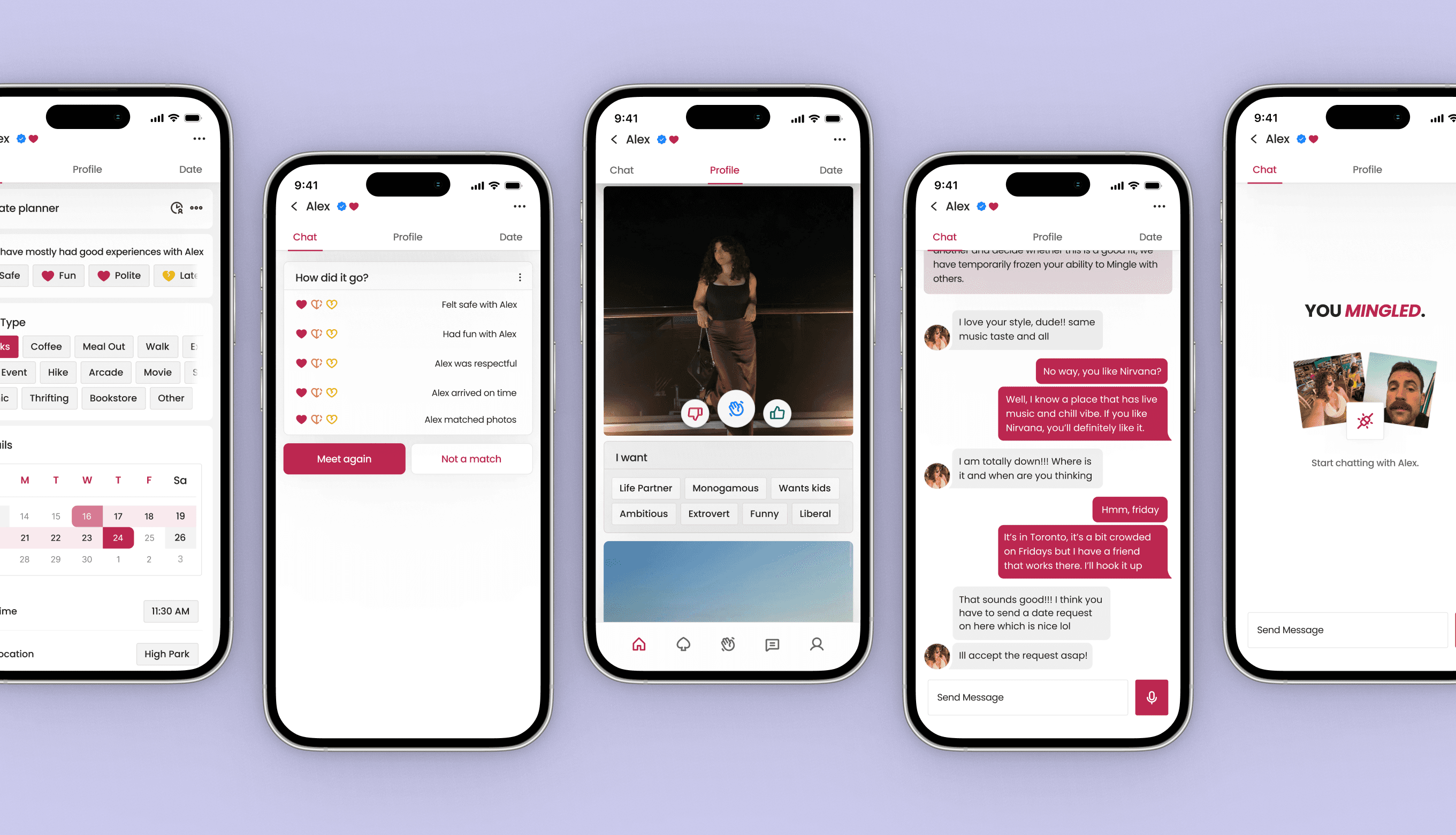

Role
Lead Designer
Team
1 Designer
Timeline
February – April 2025
Skills
UX Design, Research
Mobile App
Modals
B2C
Role
Lead Designer
Team
1 Designer
Timeline
Feb – Apr 2025
Skills
UX Design
Research
CONTEXT
CONTEXT
Swipe-driven usage reduced retention
Swipe-driven usage reduced retention
Dating apps were designed to make meeting people easier, but swipe-driven, low-intent behavior has led to burnout and poor retention reflected in industry data such as Tinder’s user base shrinking by 8% in 2024 alone. I set out to design a dating app that discourages low-quality behaviors and improves long-term retention by promoting intentional, accountable interaction.
Low-intent, swipe-driven behavior led to burnout and declining retention across dating apps. This project explored how intentional interactions could improve long-term retention.
IMPACT
IMPACT
Facilitating connection through intent
Facilitating connection through intent
In user testing, participants rated the new approach higher across key behaviors using MaxDiff analysis. Accountability and focus-driven features performed strongest for improving follow-through, conversation quality, and intent to meet. Compared to the baseline dating app flows, users were more likely to continue conversations and plan dates compared to baseline flows.
User testing showed higher accountability and follow-through. Participants were more likely to continue conversations and plan dates compared to baseline swipe-driven flows.
PRODUCT SHOWCASE
PRODUCT SHOWCASE




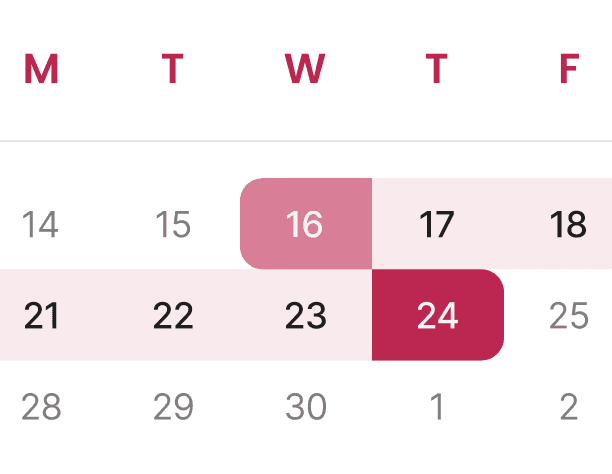





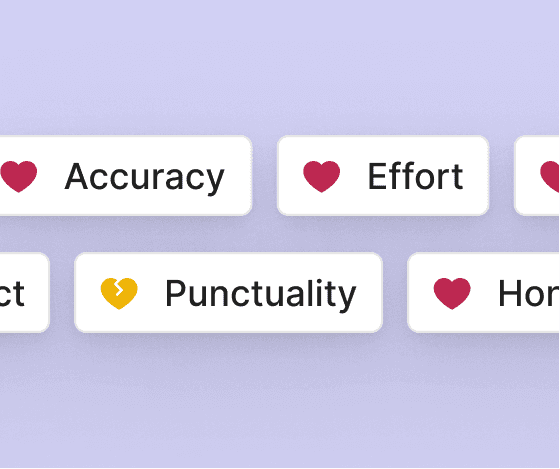



OUTCOMES
OUTCOMES
of Participants
of Participants
preferred Mingle's features over other leading online dating apps.
preferred Mingle's features over the other OLD apps.
of Participants
of Participants
believed Mingle would lead to more purposeful conversations.
said Mingle pushed them to have more conversations.
of Participants
of Participants
said accountability would make them take matches more seriously.
said Mingle made them take OLD seriously.
PROBLEM DEFINITION
PROBLEM DEFINITION
Interaction model fails to retain users
Interaction model fails to retain users
Dating apps depend on sustained engagement and successful matches to drive long-term retention and revenue, yet declining user activity and shrinking user bases across the category suggest that existing interaction models are not delivering long-term value or meeting user needs.
Dating apps rely on sustained engagement, but swipe-driven behavior leads to declining activity and shrinking user bases. Existing interaction models fail to support long-term value or user needs.
Hypothesis: If low-intent behaviors were discouraged and accountability was introduced, more users would follow through on conversations and dates, leading to higher retention.
RESEARCH QUESTIONS
RESEARCH QUESTIONS
What pain points are found across online dating apps?
User Journey & Friction
How do current interaction flows impact retention?
Retention & User Churn
What changes encourage intentional engagement?
Conversion & Outcomes
What pain points exist in OLD?
Journey & Friction
How do the flows affect retention?
Retention & Churn
What changes drive user engagement?
Conversion & Impact
Hypothesis: Increasing intent and accountability would improve follow-through and retention.
ACADEMIC INSIGHTS
ACADEMIC INSIGHTS
How dating apps shape behavior
How dating apps shape behavior
I grounded the project in peer-reviewed academic research to understand how dating apps influence user behavior over time. Drawing on large-scale, longitudinal data, these studies revealed consistent patterns and measurable outcomes, helping frame the problem beyond anecdotal experiences and providing a stronger foundation for any future design decisions.
Dating apps rely on sustained engagement, but swipe-driven behavior leads to declining activity and shrinking user bases. Existing interaction models fail to support long-term value or user needs.
USER PAIN-POINTS
USER PAIN-POINTS
Community insights from Reddit
Community insights from Reddit
Building on academic research, I reviewed discussions within the Tinder, Bumble, and Hinge subreddits, representing the three largest dating apps by market share. These communities reflect how dominant interaction models surface in real use. High-engagement threads confirmed the behaviors identified in the academic research were consistent across all three platforms.
I reviewed discussions across Tinder, Bumble, and Hinge subreddits. High-engagement threads consistently reinforced the same interaction problems identified in academic research.
REDDIT DISCOURSE


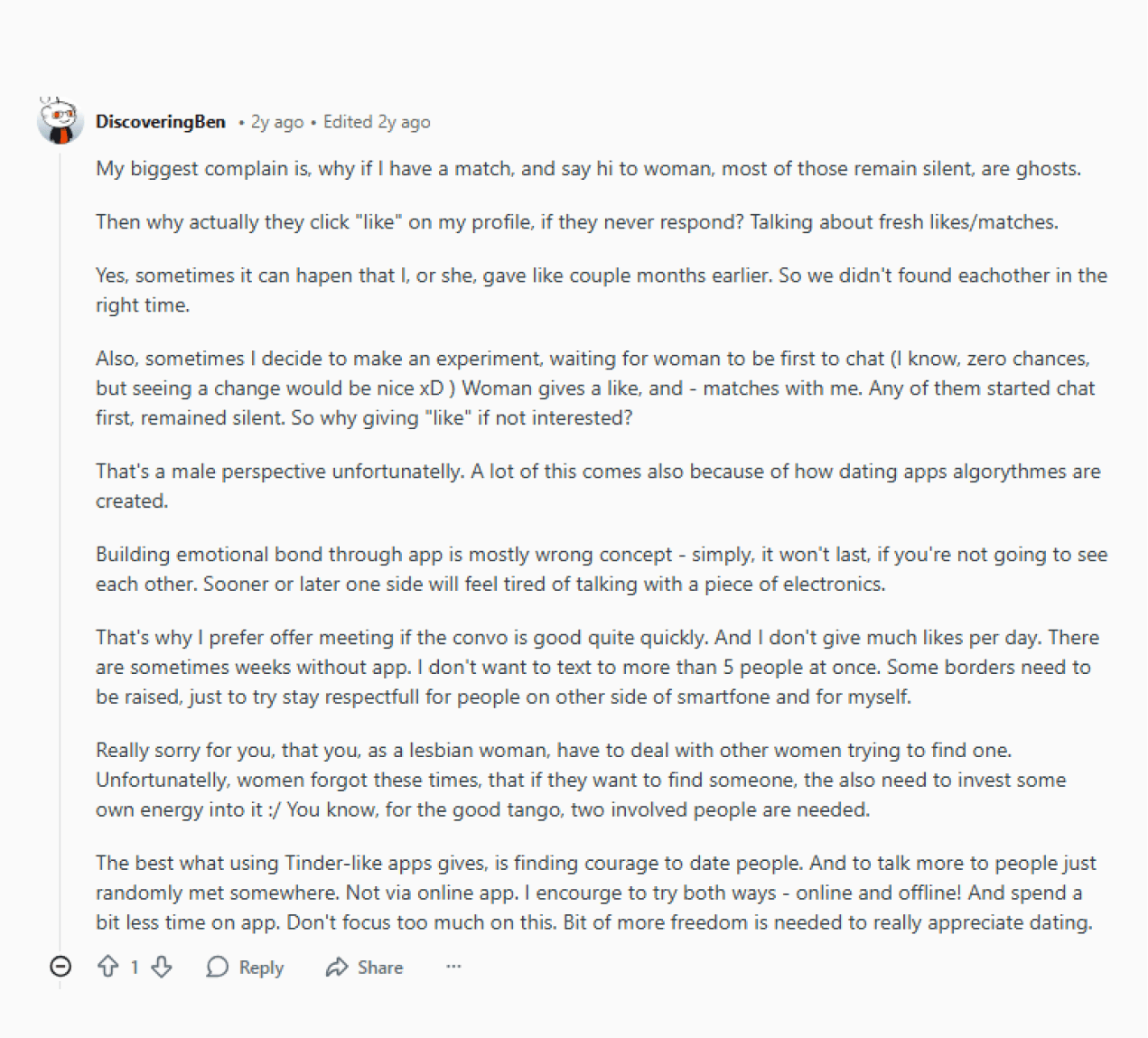

INSIGHTS
INSIGHTS
Connection Breakdown
Users struggle to form meaningful connections.
Match Stagnation
Matches rarely lead to deep conversations or dates.
Frequent Ghosting
Matches commonly stop responding altogether.
Shallowness
Users struggle to find connection.
Stagnation
Matches rarely convert to dates.
Ghosting
Ghosting is very common outcome.
REDDIT DISCOURSE








MARKET RESEARCH
MARKET RESEARCH
Examining competitive interaction models
Examining competitive interaction models
I analyzed Tinder, Bumble, and Hinge to understand how the largest dating apps structure their user experience. These platforms were chosen because they represent the dominant interaction models in the category. Despite distinct positioning, their core features and mechanics are largely the same, leading to similar behaviors and outcomes beyond surface-level differences.
I analyzed Tinder, Bumble, and Hinge to understand how leading dating apps structure interaction. Despite different positioning, their core mechanics produce similar behaviors and outcomes.
MARKET POSITIONING
MARKET POSITIONING


High-volume swiping prioritizes activity, often at the expense of meaningful follow-through.
High-volume swiping prioritizes activity, often at the expense of meaningful follow-through.


Women-first messaging adds intent early, but the conversations still stall.
Women-first messaging adds intent early, but the conversations still stall.


Prompt-driven profiles encourage conversations, but rely on traditional matching flows.
Prompt-driven profiles encourage conversations, but rely on traditional matching flows.
Key Insight: Match Group’s ownership of the two leading dating apps supports the research showing shared engagement loops are designed to sustain habitual use over connection.
Key Insight: Match Group’s ownership of the two leading dating apps supports the research showing shared engagement loops are designed to sustain habitual use over connection.
JOURNEY BREAKDOWN
JOURNEY BREAKDOWN
Identifying friction in the user journey
Identifying friction in the user journey
I mapped research insights onto the dating app journey to see where breakdowns. Early stages showed shallow swiping, momentum dropped immediately after matching, and very few users progressed to meeting offline. This clarified where the experience fails and what needed to change, shifting away from gamified swiping toward follow-through and real connection.
Mapping research insights revealed early shallow swiping, momentum drop-off, and delayed friction. These patterns highlighted where changes were needed to shift behavior toward real connection.
Opportunity
Seekers
Opportunity
Seekers
Onboarding & Discovery
Onboarding & Discovery
Swiping & Comparison
Swiping & Comparison
Matching & Evaluation
Matching & Evaluation
Chatting &
Next Steps
Chatting &
Next Steps
Exit or Conversion
Exit or Conversion
Journey
Friction
Journey
Friction
Immediate choice overload at entry.
Choice overload at entry.
Profiles blur together quickly.
Profiles blur together quickly.
Matches usually lack momentum.
Matches usually lack momentum.
Chats end with abrupt ghosting.
Chats end with abrupt ghosting.
Users drop off after matching.
Users drop off after matching.
IDEATION
IDEATION
Collaboratively exploring solution directions
Collaboratively exploring solution directions
I conducted open-ended interviews with 10 dating app users to understand what they felt was missing from current platforms. Discussions focused on what defines a good dating experience and what would motivate users to take matches more seriously. This clarified what an improved model should prioritize and informed the HMW Statement that guided the solution direction.
I conducted open-ended interviews with dating app users to understand missing needs and validate assumptions. Insights informed a focused How Might We statement to guide ideation.
USER INTERVIEW

After speaking with them, I ran several ideation exercises to turn insights into directions. Card sorting revealed how users grouped problems and solutions, dot voting helped prioritize the strongest ideas, and brainwriting enabled focused solution exploration without group bias.
After interviews, I explored multiple ideation directions by clustering ideas, identifying patterns, and avoiding solution bias.
WORKSHOPPING SESSION
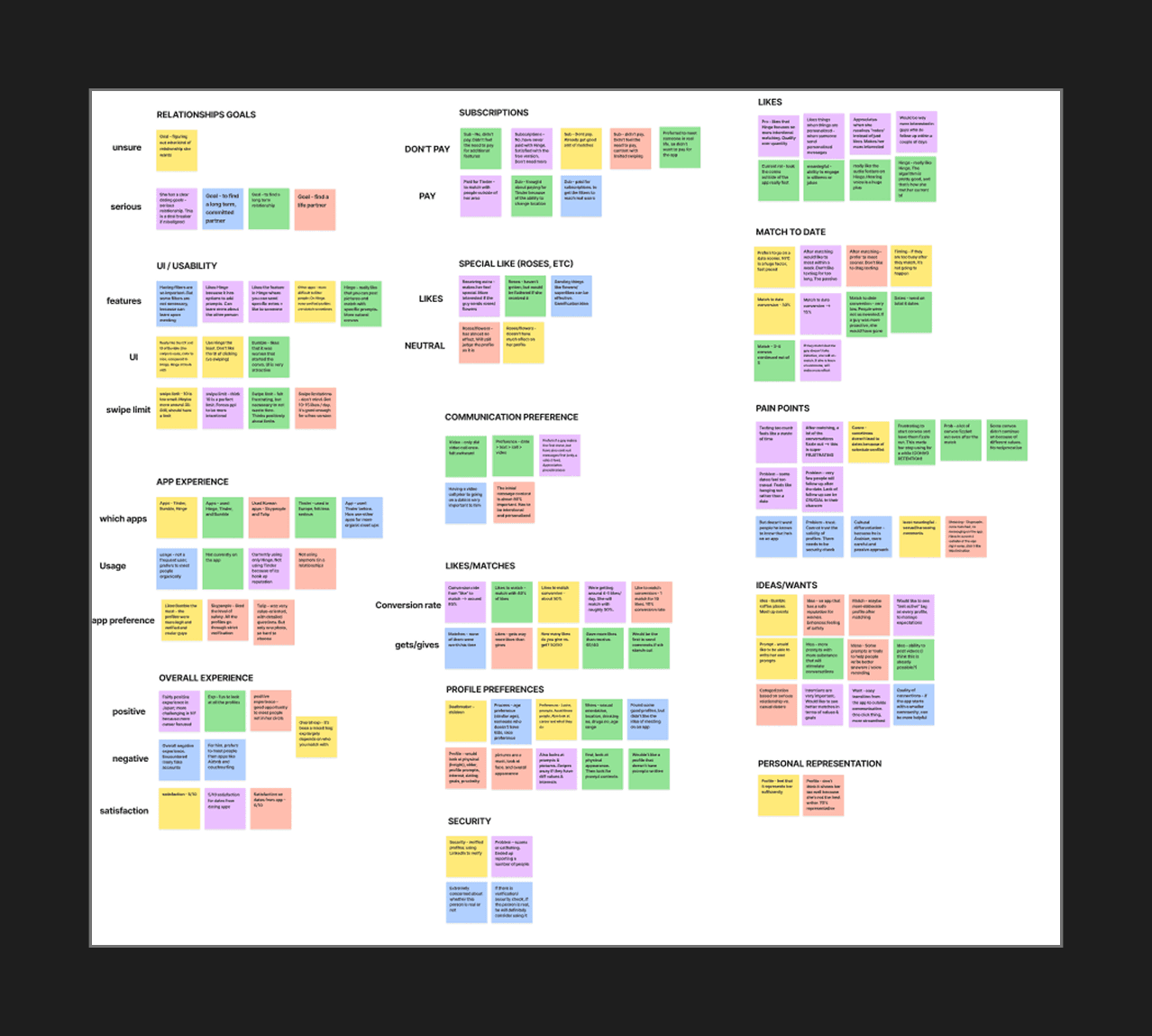
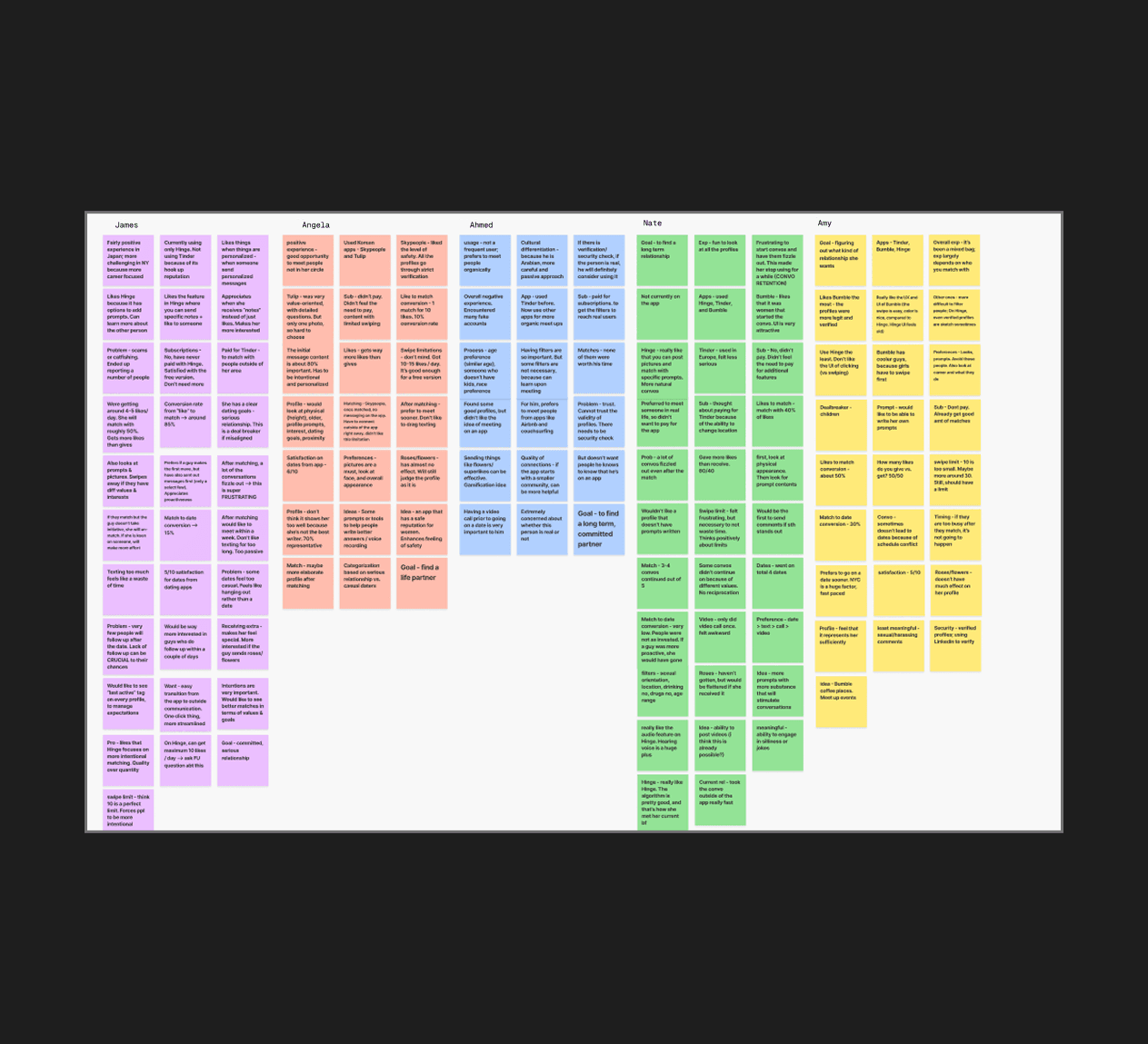
HMW: How might we design a dating app that encourages users to follow through on matches and form genuine connections while still sustaining long-term engagement and revenue?
FEATURE SIGNALS
FEATURE SIGNALS
Ghosting Penalties
Introduce consequences for ghosting to encourage accountability and follow-through.
Limiting Overload
Limit active user conversations to help users focus and evaluate one connection at a time.
Incentivizing Dates
Add time-based match constraints that push matches toward real-world meetings.
Ghosting Penalties
Introduce consequences for ghosting to encourage accountability and follow-through.
Limiting Overload
Limit active user conversations to help users focus and evaluate one connection at a time.
Incentivizing Dates
Add time-based match constraints that push matches toward real-world meetings.
USER INTERVIEW


WORKSHOPPING SESSION




HMW: How might we design a dating app that encourages intentional connection while sustaining long-term engagement?
KEY FLOWS
KEY FLOWS
Shaping behavior through systems
Shaping behavior through systems
After weeks of research, user conversations, workshopping, and repeated iteration, these flows represent the final design direction. Each flow targets a specific breakdown in the dating app journey, addressing where momentum is lost. Rather than adding features in isolation, Mingle is a system that intervenes at key moments to help users focus and move conversations forward.
After research, I reframed conversations, workshopping, and ideation into focused interaction flows. Each flow targets a specific breakdown in the dating journey, encouraging intentional use over isolated features.
ENFORCED ACCOUNTABILITY
ENFORCED ACCOUNTABILITY






Mingle monetizes ghosting to discourage low-effort toxic user behavior. Through introducing monetary consequences, Mingle incentivizes accountability and encourages follow-through.
Mingle monetizes ghosting to discourage low-effort toxic user behavior. Through introducing monetary consequences, Mingle incentivizes accountability and encourages follow-through.
INTENTIONAL CONVERSATIONS
INTENTIONAL CONVERSATIONS






Mingle limits users to one active conversation at a time to remove distractions. This allows them to focus on a match and decide whether there might be a connection worth pursuing.
Mingle limits users to one active conversation at a time to remove distractions. This allows them to focus on a match and decide whether there might be a connection worth pursuing.
OFFLINE OUTCOMES
OFFLINE OUTCOMES




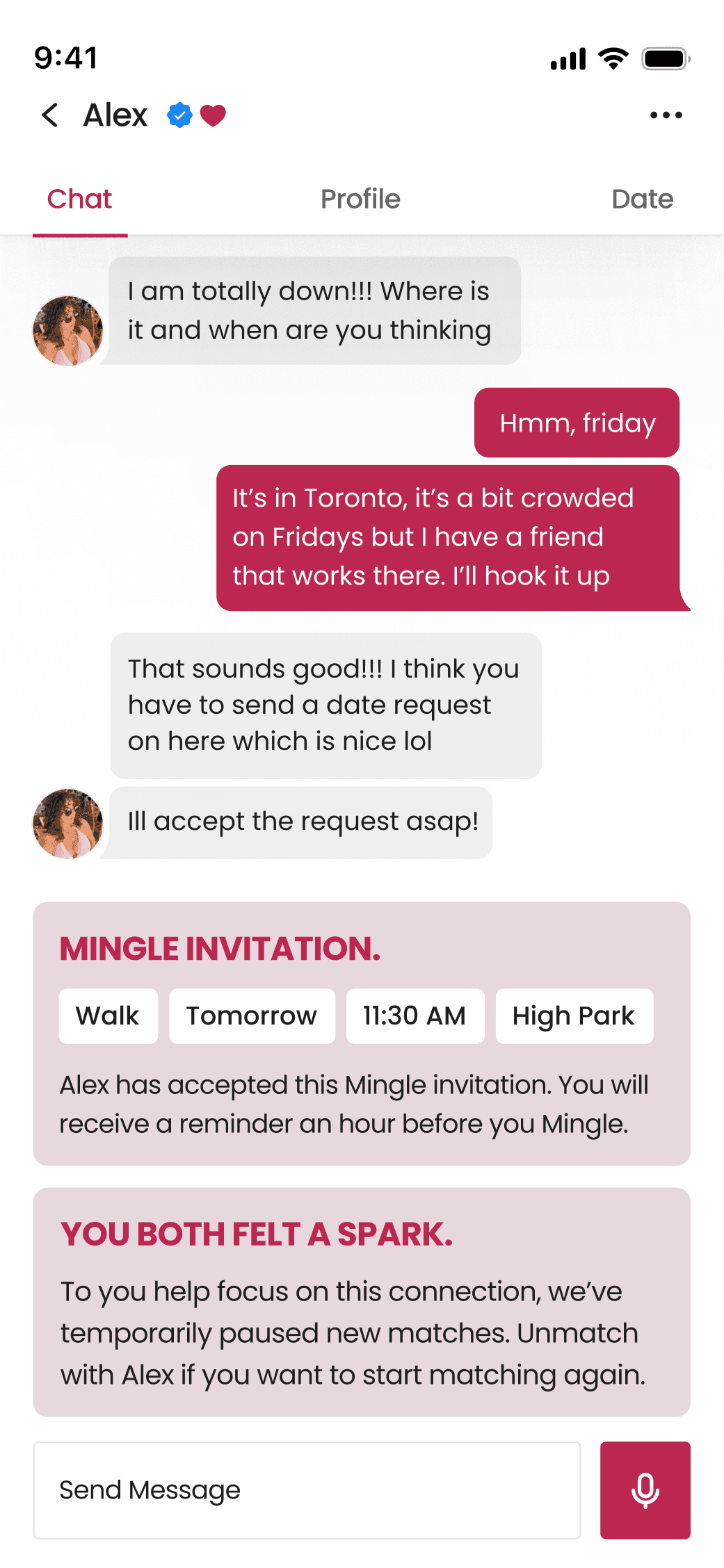

Mingle introduces a “Meet Again” state if both users feel a spark after their date allowing them to focus on exploring the connection without the distraction of other conversations.
Mingle introduces a “Meet Again” state if both users feel a spark after their date allowing them to focus on exploring the connection without the distraction of other conversations.
REFLECTION
REFLECTION
User value drives growth
User value drives growth
This project reinforced that optimizing purely for short-term profit can undermine long-term value, as seen across the dating apps. By treating accountability as a design constraint, the product shifts behavior toward healthier and more sustainable outcomes. Prioritizing user needs creates a stronger foundation for long-term growth than extractive engagement tactics.
This project showed that optimizing for user value, not short-term engagement, leads to sustainable growth. Treating accountability as a design constraint helped shift behavior and create stronger long-term outcomes.
MAXDIFF ANALYSIS
MAXDIFF ANALYSIS


CONCEPT
2025
Encouraged
intentional swiping
MOBILE APP
END TO END
B2C


Role
Lead Designer
Team
1 Designer
Timeline
February – April 2025
Skills
UX Design, Research
CONTEXT
Swipe-driven usage reduced retention
Low-intent, swipe-driven behavior led to burnout and declining retention across dating apps. This project explored how intentional interactions could improve long-term retention.
ENFORCED ACCOUNTABILITY


INTENTIONAL CONVERSATIONS


OFFLINE OUTCOMES


IMPACT
Facilitating connection through intent
User testing showed higher accountability and follow-through. Participants were more likely to continue conversations and plan dates compared to baseline swipe-driven flows.
OUTCOME
of User Testing Participants
within the 30 days following launch.
of User Testing Participants
across platform’s two core flows.
of User Testing Participants
on monetization-linked flows.
PROBLEM DEFINITION
Interaction model fails to retain users
Dating apps rely on sustained engagement, but swipe-driven behavior leads to declining activity and shrinking user bases. Existing interaction models fail to support long-term value or user needs.
Hypothesis: Increasing intent and accountability would improve follow-through and retention.
RESEARCH QUESTIONS
What pain points exist across dating apps?
User Journey & Friction
How do the interaction flows impact retention?
Retention & User Churn
What changes encourage intentional engagement?
Conversion & Outcomes
RESEARCH FOUNDATION
How dating apps shape behavior
I grounded the project in peer-reviewed research on dating app behavior, drawing from large-scale and longitudinal studies to identify persistent patterns impacting retention and user experience.
Reward Loop
Dopamine-driven matching encourages toxic habitual swiping, thus reducing intentional likes and thoughtful decisions.
Match Focus
Current OLD monetization models rewards maximizing matches, reinforcing quantity not intentional selection.
Intent breakdown
As matches become less intentional, users are less far less motivated to message, connect, or meet offline due to paradox of choice.
USER PAIN-POINTS
Community insights from Reddit
I reviewed discussions across Tinder, Bumble, and Hinge subreddits. High-engagement threads consistently reinforced the same interaction problems identified in academic research.
REDDIT DISCOURSE


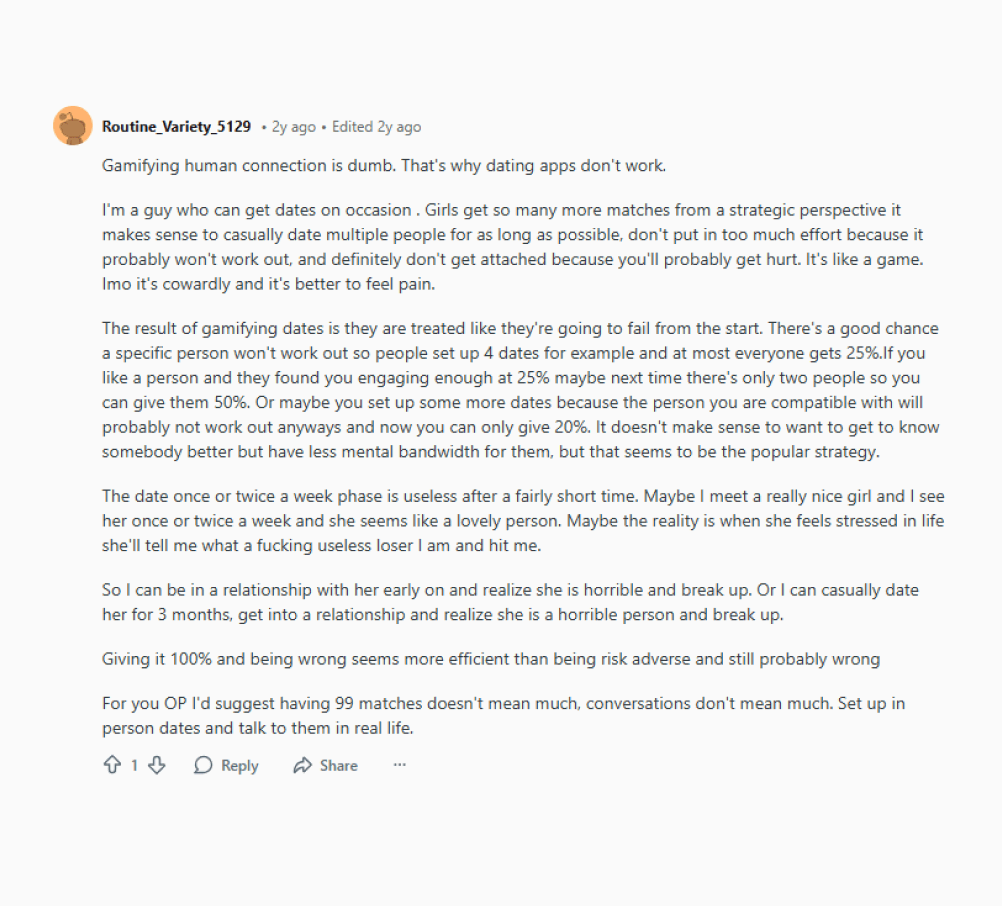

INSIGHTS
Connection Breakdown
Users struggle to form meaningful connections.
Match Stagnation
Matches rarely progress into real conversations.
Frequent Ghosting
Matches commonly stop responding altogether.
MARKET RESEARCH
Examining competitive interaction models
I analyzed Tinder, Bumble, and Hinge to understand how leading dating apps structure interaction. Despite different positioning, their core mechanics produce similar behaviors and outcomes.


Hypothesis: Shared models optimize engagement not meaningful connection.
JOURNEY BREAKDOWN
Identifying friction in the user journey
Mapping research insights revealed early shallow swiping, momentum drop-off, and delayed friction. These patterns highlighted where changes were needed to shift behavior toward real connection.


IDEATION
Collaboratively exploring solution directions
I conducted open-ended interviews with dating app users to understand missing needs and validate assumptions. Insights informed a focused How Might We statement to guide ideation.
After interviews, I explored multiple ideation directions by clustering ideas, identifying patterns, and avoiding solution bias.
USER INTERVIEW


FEATURE SIGNALS
Ghosting Penalties
Introduce consequences for ghosting to encourage accountability and follow-through.
Limiting Overload
Limit active user conversations to help users focus and evaluate one connection at a time.
Incentivizing Dates
Add time-based match constraints that push matches users toward real-world meetings.
WORKSHOPPING SESSION


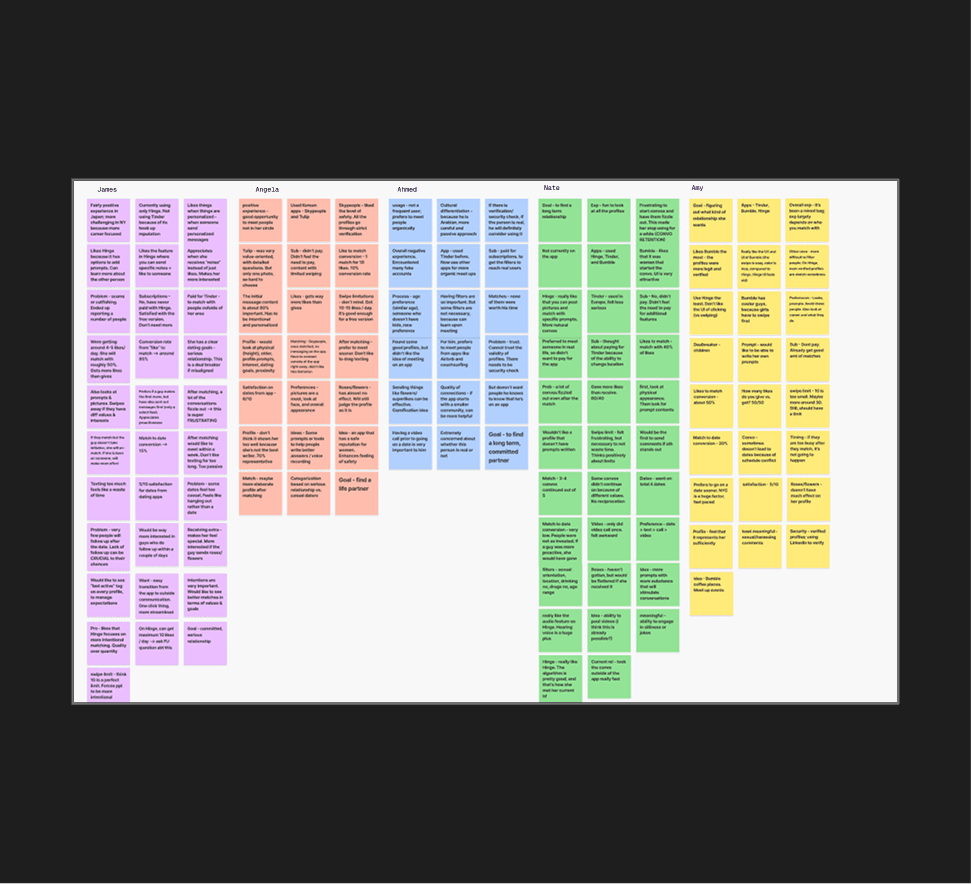

HMW: How might we design a dating app that leads to intentional connection while sustaining long-term user engagement?
KEY FLOWS
Shaping behavior through systems
After research, I reframed conversations, workshopping, and ideation into focused interaction flows. Each flow targets a specific breakdown in the dating journey, encouraging intentional use over isolated features.
ENFORCED ACCOUNTABILITY


Mingle discourages ghosting behavior by introducing accountability and encouraging follow-through.
INTENTIONAL CONVERSATIONS


Mingle limits users to one active conversation, reducing distraction and helping users focus on a single connection.
OFFLINE OUTCOMES


Mingle adds a “Meet Again” state that creates space for reflection without incoming distractions.
REFLECTION
User value drives growth
This project showed that optimizing for user value, not short-term engagement, leads to sustainable growth. Treating accountability as a design constraint helped shift behavior and create stronger long-term outcomes.
MAXDIFF ANALYSIS

